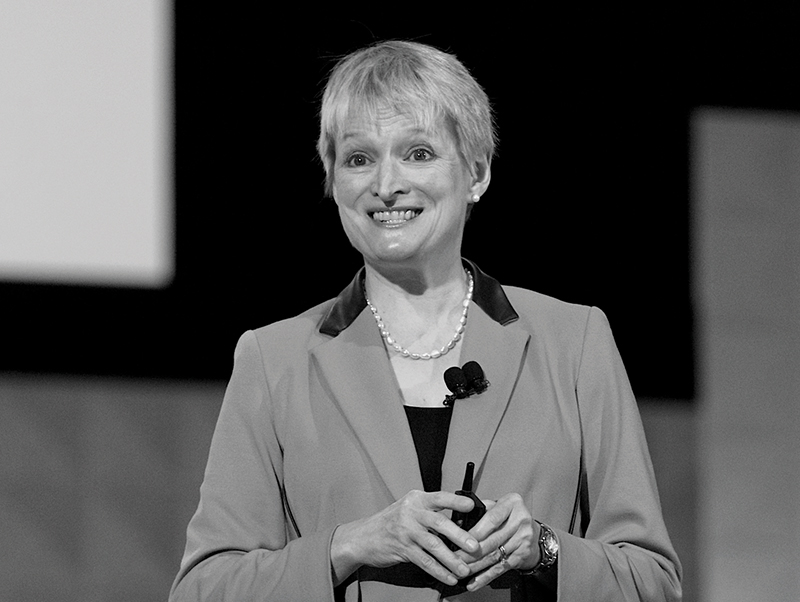Interview with Rita McGrath
The European Business Review talks to Forbes’ #6 most influential business thinker, Rita McGrath, about innovation, the end of competitive advantage, and how you can stay relevant in today’s volatile business environment.
To begin, what are the key points that you want executives to take away from your talk at the World Business Forum?
The first thing I want them to think about is how differently they would operate if they assumed their existing competitive advantages would have a shorter life than they may have assumed in the past… A second key message is that they need to be building pipelines of competitive advantage – and that requires investing resources in new things and figuring out how to get innovators appropriately rewarded. The third thing would be recognising that strategy has really changed from being a largely analytic exercise with reams of spread sheets and lots of data about past transactions, and that we have to at least be adding in a future-oriented, somewhat visionary, dynamic component to it.
So once leaders recognise these changes, what can they do to put them into practice?
Now you’re into implementation… The first thing leaders need to think about is their own agenda, and I mean that really literally. Because if your agenda is all about today’s quarter – how much money are we getting to shareholders, and how can we exploit today’s business – you’re not going to be thinking about the future. You really need to be thinking across three time horizons. There’s today, and frankly the profits you’re making today are an outcome of decisions and actions you took yesterday, so it’s a lagging indicator. Then you need to be thinking about the near term, or the medium term: what are the investments I’m making that are going to replenish the pool of profits for today? What are the options that I’m investing in that may or may not be important to my future? And sometimes with options the problem is that you can’t put a value on them; you don’t know for sure if they’re going to work out or not. But you have to be placing those bets, and this is where managers need to be thinking differently – thinking in portfolio terms, rather than just quarter by quarter.
And in terms of the future, how can executives make sure they’re in a position to deal with challenges and new competition when or if it arises?
I think a lot of it comes down to what are the options in your pipeline – if you’ve got no options and something happens… well, you’ve got a problem! When you’re thinking about coping with an unexpected event you can either invest in prevention, so it doesn’t happen, or you can invest in being resilient, so if it does happen you can respond. I think that companies tend to overinvest in prevention, and hope this bad thing never occurs, and they underinvest in resilience. What makes a company resilient? Well, things like cross-training for your employees, so that if there’s a downturn in one place you have people who maybe have the skills to build something different.
Turning to innovation, you talk about the need to treat it as a core proficiency; what does this mean for leaders – how can they do this?
To begin with, it needs to be on the agenda – a lot of leaders don’t even talk about it! Or rather they talk about it a lot, but they don’t actually do anything. I think there needs to be a governance process for innovation, there needs to be metrics associated with it – the best companies I know have dashboards, they’ll look at things like how many people were trained, how many ideas were submitted, what metrics came out of the innovations, what flows came back into the innovation fund, how many customers they got from these new products. So there’s actually a consciousness and a measurement of the process of innovation and the company’s investment in it.
We’ve got decades of innovation research now which shows when the process works, and what kinds of innovation are suitable to certain settings – because not all innovations are the same. Some innovations are experience innovations, some are innovations around process, some innovations are basically combining things that already exist into something new, and some innovations are genuine technological breakthroughs. It’s interesting when you think about the different types of innovations and where they come from, so my encouragement to leaders would be: get educated about it, get smarter about it. Because making it up from scratch is really a waste of time.
You also talk about a shift towards entrepreneurialism. What do you think this is going to mean for the future of organisations, the future of business?
Big shifts for how people manage their careers, how people get talent, how they hold onto talent. I think we’re going to go from a concept of careers as ladders to a concept of careers as “tours of duty”… I think we’re going to see more dynamism in the way we handle HR practices – less emphasis on hierarchical levels and more emphasis on how does an individual fit with the job to be done and what the company needs. So I think there will be a lot of implications for how we structure careers.
Do you think that’s going to be perceived as a challenge in a lot of big organisations?
Absolutely. A lot of our HR systems simply come from the machine age, where it’s bands – you start off at, say, a level 14, and eventually you become a level three, and each level has its developmental experiences. And I think it is a real challenge; your projects may require skills that have nothing to do with a hierarchical level. They may require a unique set of skills that can be found in only one person, who may not even be permanently associated with your organisation. So I think the whole HR idea is going to undergo some pretty dramatic questioning as we think about these much more entrepreneurial ways of driving our lives.
Rita McGrath is a Professor at Columbia Business School and globally-recognised expert on strategy. Rita has co-authored three books, and most recently authored the now bestselling The End of Competitive Advantage: How to Keep Your Strategy Moving as Fast as Your Business (Harvard Business Review Press, 2013).


























![“Does Everyone Hear Me OK?”: How to Lead Virtual Teams Effectively iStock-1438575049 (1) [Converted]](https://www.europeanbusinessreview.com/wp-content/uploads/2024/11/iStock-1438575049-1-Converted-100x70.jpg)




